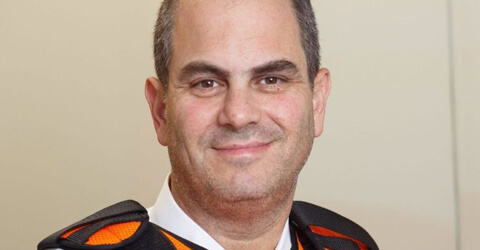Eli Beer is the Founder and President of United Hatzalah, Israel’s National Community-based Volunteer EMS Organization. He has re-imagined the first response by training EMT volunteers to respond to local calls and keep people alive until official help arrives. He has saved a billion lives till now and has done remarkable work in the medical field.
An incident left a lasting impression on young Beer; when he was a little boy of six, he was walking home from school and witnessed a bus bombing in Jerusalem. This traumatic experience inspired Beer to seek a career that saves lives and finds a solution to these unprecedented times of sorrow. When he was fifteen, he took an EMT course and immediately began volunteering in an ambulance. But after observing many trauma cases, he found that when someone truly needed prompt medical attention, the ambulance did not get there in time because of traffic and the distance required to travel.
Beer was keen on finding a solution to this problem. At the young age of seventeen, he gathered a small group of EMTs with a passion for saving lives to listen to police scanners and rush to the scene when medical help was needed in their neighbourhood. The initiative turned into a full-fledged community-based volunteer EMS organization called United Hatzalah, Hebrew for “rescue.”
Beer showed one of United Hatzalah’s iconic ambulance motorcycles –— known as an “ambucycle.” He explained how the bikes help its volunteers achieve a quick three minute response time as Israeli traffic can be difficult for larger vehicles, the ambucycles can help people faster.
Beer thinks his purpose in life is, “To make sure that no one dies waiting for an ambulance. If someone needs help he should get it immediately. I always pray to Hashem that no one gets sick or hurt but if they do, I pray to Hashem that our people should get there on time.”
The Ambucycles can not carry a person. However, they can stabilize a patient long enough for an ambulance to arrive, with the help of an onboard trauma kit, oxygen canister, defibrillator, and more. The medics each have a smartphone equipped with GPS, allowing volunteers to be notified of an emergency in their vicinity and respond within minutes. Each year, the bikes serve almost 500 calls, one-quarter of which are life-threatening. And they do it out of the sheer goodness of their hearts without getting paid in return. Beer hopes other communities will follow in the ambulance service’s footsteps.
“We want the community of Phoenix and Scottsdale to really participate in saving lives both here in their own community and in Israel,” Beer told the Jewish News. He hopes to have a volunteer in every town.
“We are training more and more volunteers and bringing them into our family,” Beer said. “Once here, they bridge the gaps between the different worlds, rising above politics, above money and above their differences, all in order to rush out and save the lives of total strangers that need help right nearby.”
A unique component in United Hatzalah is the Psychotrauma and Crisis Response Unit. This was developed as the therapist noticed that the people witnessing a medical emergency often suffer from shock and emotional stress and need treatment along with the patient who suffered the crisis. She then created a specialized unit of therapists, psychologists, and psychiatrists tasked with responding in the lead to medical emergencies where someone is suffering from a severe emotional or psychological stress reaction. This intervention has been shown to prevent the onset of Acute Stress Reaction and Post Traumatic Stress Disorder from developing.
The organization now has more than 2,000 volunteers and has helped 207,000 people. Beer serves as the President at the United Hatzalah. He has responded to some of the worst civil, wartime and terror-related incidents in the country. In 2010, because of his bravado and an inspiring mission to help others, he was named Social Entrepreneur of the Year in Israel by the Schwab Foundation for Social Entrepreneurship. Two years later, he became a World Economic Forum Young Global Leader. Beer is already in talks with organizations in India and hopes to expand the Ambucycle’s reach across the world to as many countries as he can.
The biggest challenge faced by the volunteer-based EMS organization, as Beer says, “is Probably, the biggest challenge we face is getting people to financially support our work during COVID-19 since so many people have lost their jobs. Another challenge is the risk that our own volunteers will get sick from COVID-19. With over 2,000 emergencies a day, our volunteers are going into people’s homes who are asymptomatic and unknowingly infected with COVID-19. As a result, our volunteers themselves are exposed and it has happened a few times that they too get sick. It is a big challenge to keep our volunteers safe.”
An easy way to help the organization, as Beer says, is, “During this challenging time of COVID-19, we are in desperate need of sponsors and partners. I am available to meet in person (using safety protocols), talk on the phone, Zoom, or Skype to discuss sponsorship and partnership opportunities. We are looking for Sponsors for a Day of Lifesaving! These sponsors donate money and are partners with us in all of the rescues made that day. They help us reach nearly 2,000 people after the day is over. They receive a detailed list of all the people who enabled us to treat that day. We will also send stories of the more dramatic rescues made.
Choose a birthday, anniversary, or any special day and dedicate it to saving lives! It is the greatest gift you can give because saving another person’s life, let alone 2,000, is something truly incredible.”







